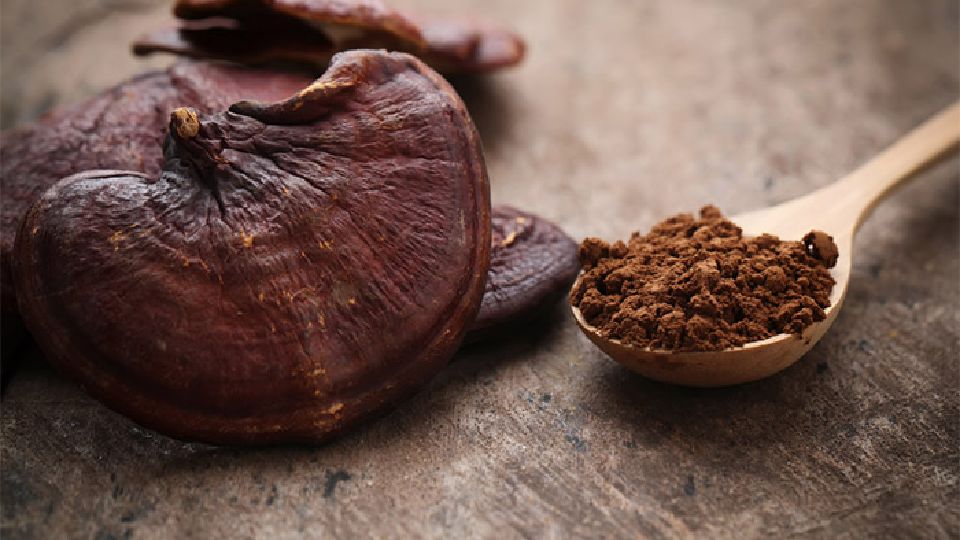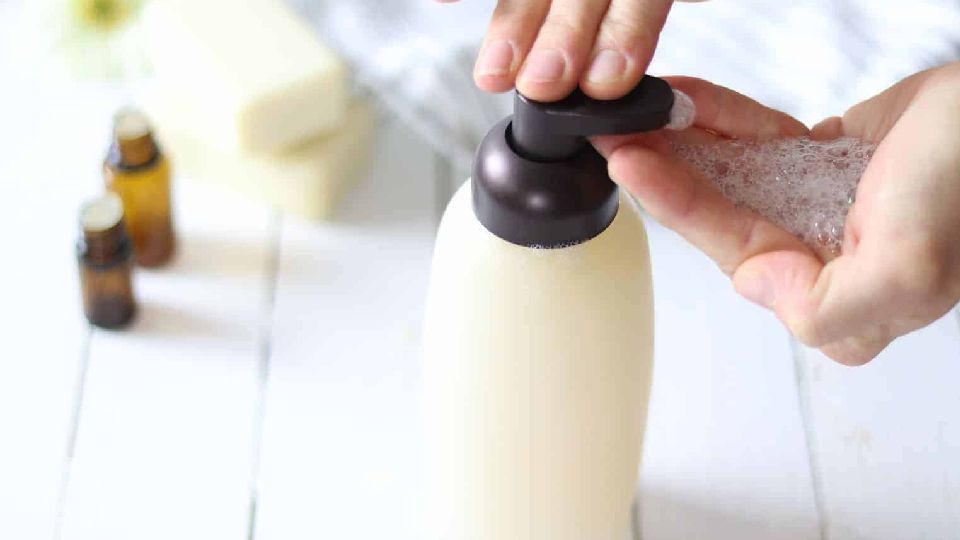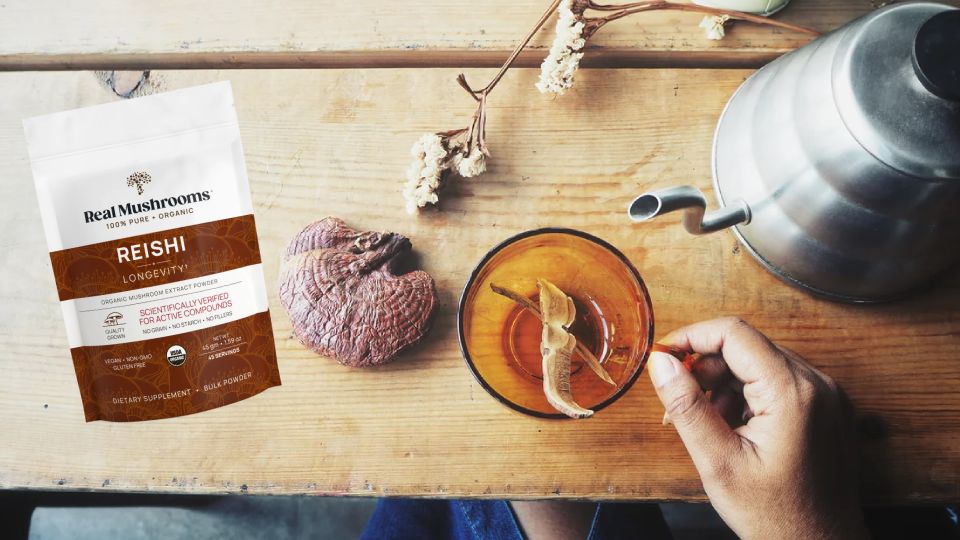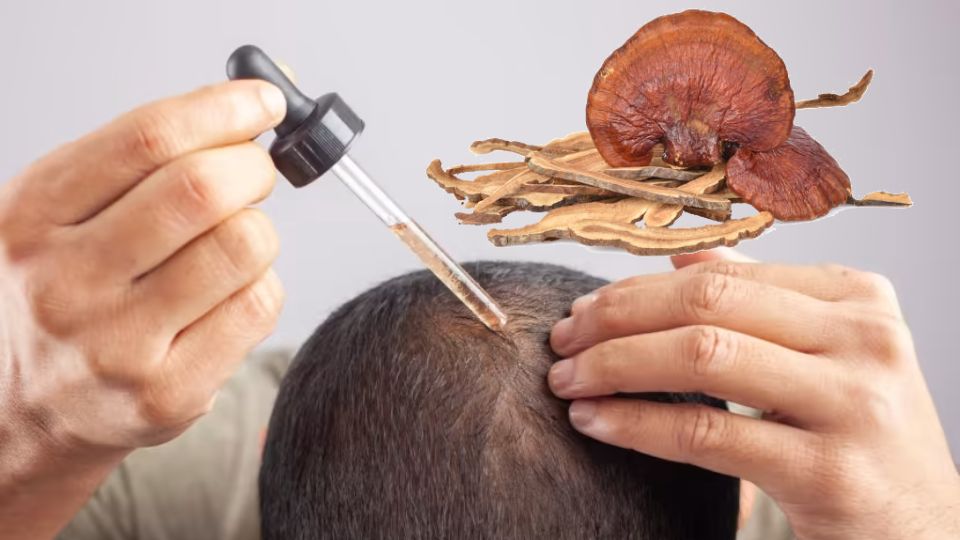Reishi Mushroom Benefits for Hair: A Comprehensive Guide
The Reishi mushroom, known as Ganoderma lucidum or Lingzhi, holds a rich history in Asia, often been revered as the “herb of spiritual potency” for over 2,000 years. It’s been used alongside other mushrooms like Lion’s mane, and cordyceps for various health purposes.
Reishi mushrooms are large, dark mushrooms with a glossy exterior and a woody texture. The term “lucidus” in Latin means “shiny” or “brilliant,” describing the mushroom’s varnished appearance. In China, it’s called Lingzhi, and in Japan, it’s known as reishi or mannentake.
These mushrooms boast an extensive list of health benefits, including blood pressure reduction, cholesterol control, anxiety alleviation, and a reduced risk of heart disease[1]. In recent times, the internet has broadened its popularity as a Western nutritional supplement, with claims of potential hair growth benefits.
In this article, we’ll explore how Reishi Mushroom benefits hair health. We’ll also delve into the medical compounds within Reishi mushrooms that support hair growth and their ability to combat hair loss and improve regrowth[2]. Stick around for an exclusive DIY Reishi shampoo recipe at the end.
In this article:
What Medical Compounds in Reishi Mushroom Benefits Hair Growth?
Reishi contains a rich array of medical compounds, but what specifically aids in promoting hair growth? Reishi belongs to a group of natural ingredients called adaptogens. These adaptogens are believed to have a wide array of beneficial effects on our bodies
Health Benefits of Adaptogens and Their Role
- Adaptogens, like plants and mushrooms, aid your body in managing stress, anxiety, and fatigue.
- They promote balance in your body, helping it return to homeostasis.
- While adaptogens offer temporary relief, they aren’t a long-term stress solution.
- The aim of taking adaptogens is to restore your body’s equilibrium.
- Adaptogens adjust chemical reactions in your body based on your specific needs.
- They can reduce anxiety, alleviate depression, and boost energy.
- Adaptogens help regulate your emotional responses to stress.
- They also enhance your immune system.
- Particularly effective for moderating stress, anxiety, and chronic fatigue by nourishing the adrenal glands.
- Adaptogens reduce sensitivity to stressors, maintaining cognitive function and focus.
- These effects accumulate, so regular use ensures maximum benefits.
You can read more about Reishi Mushroom Health Benefits and its medical compounds on our blog page.
How Reishi Mushroom Benefits Hair Health
The benefits of Reishi mushroom for hair health are multifaceted, and understanding these can help you achieve that enviable head of hair:

1. How Much DHT Can Reishi Mushroom Reduce?
Dihydrotestosterone (DHT) is a hormone associated with male pattern baldness and hair loss. Preliminary research suggests that reishi mushrooms might have anti-androgenic properties, potentially reducing DHT levels. It’s essential to note that the exact reduction in DHT due to reishi mushrooms isn’t well-established. The impact of reishi can vary from person to person, depending on factors like overall health, genetics, and the dosage of reishi supplements or extracts.
While reishi mushrooms may have some potential to reduce DHT levels, more research is needed to determine its effectiveness as a hair loss treatment.
2. Reducing Scalp Inflammation
Reishi mushrooms, rich in antioxidants, also possess anti-inflammatory properties, such as polysaccharides and peptidoglycans[3]. They boost blood circulation, aiding the delivery of oxygen and hair-nourishing nutrients to your scalp, reducing scalp inflammation, and enhancing nutrient flow for healthier hair. This supports healthy hair growth and reduces the risk of scalp issues like psoriasis, eczema, and dandruff.
3. Antioxidant Properties
The antioxidant properties of reishi mushrooms play a crucial role in protecting hair follicles from free radical damage and oxidative stress[4]. This, in turn, helps maintain healthy hair growth.
4. Nutrient Profiling
Reishi mushrooms are rich in essential vitamins and minerals that support overall health and hair growth. These nutrients provide the hair follicles with the nourishment they need to thrive.
5. Balancing Hormones
Hormonal imbalances can lead to issues like hair loss and thinning. Reishi mushrooms have the potential to help balance your hormones, supporting healthier hair growth. Some research indicates they may also impact specific sex hormones, such as potentially enhancing testosterone, a vital male hormone.
Are Reishi Mushrooms Good for Hair Loss?
The answer is a resounding “yes.” Reishi mushrooms have shown their efficacy in combating hair loss by reducing DHT levels, combating inflammation, and providing essential nutrients for hair health, but all reishi products face a significant challenge that may limit their effectiveness as hair treatments.
The active compounds, ganoderic acids in reishi, have short half-lives, lasting only about 40 minutes in the human body. When taken orally, reishi is swiftly metabolized in the digestive tract and eliminated from the body. Any potential DHT-reduction effect may not last long enough to influence hair loss, as DHT suppression requires a longer duration for new growth.
Consult your healthcare provider before using it as a supplement. Like other herbal remedies, it may have unwanted side effects or interact with your existing medications.
The half-life concern also applies to shampoos and serums containing reishi. Its effect is unlikely to endure sufficiently for hair follicles to support growth and new growth phases.
How to Use Reishi Mushrooms for Hair Health?

You can include Reishi mushrooms in your daily routine to enhance hair health in two ways:
- Topical Application:
- Mix Reishi tincture with a few drops of coconut oil or jojoba oil.
- Massage into your scalp and leave on for a few hours or overnight.
- Rinse with shampoo.
- Oral Consumption:
- Consume Reishi through teas, soups, or supplements.
- Enhances scalp health and supports hair follicles.
- Shifts hair from resting to active growth phase.
- Reishi Mushroom Shampoo:
- Look for shampoos with Reishi mushroom extract.
- Apply to wet hair, and massage into the scalp.
- Leave on for a few minutes, then rinse.
DIY Reishi Mushroom Shampoo for Hair Growth
If you’re the DIY type, you can even create your own reishi mushroom shampoo to harness the power of these fungi for healthier, more vibrant hair.
Ingredients:
- 1 cup warm water
- 1 tablespoon aloe vera
- 1 tablespoon honey
- 2 tablespoons avocado oil
- 10-15 drops of rosemary essential oil
- 10-15 drops of lemon essential oil
- 1/2 cup castile soap
- Reishi extract (1 cup)
Instructions:
- Bring a pot of water to boil, remove from heat, and add in the reishi extract powder to steep.
- Allow the mixture to cool to room temperature, and then discard the reishi solids.
- Combine the reishi tea with the rest of the ingredients in a blender.
- Transfer the mixture into a bowl and add the castile soap.
- Stir until well combined, making sure not to shake to prevent too much foam.
- Store the shampoo in an airtight container.
- Apply the shampoo to wet hair, taking two to three minutes to massage into the scalp.
- The shampoo can sit for up to five minutes and then rinse completely in lukewarm water.
- Follow up with an apple cider vinegar rinse to balance the pH of your scalp.
Reishi Tea Recipe
Visit a natural food store to purchase dried Reishi mushrooms for your morning tea. Beyond hair health, enjoy a variety of health benefits with Reishi tea.
Ingredient:
- 1-2 teaspoons of dried reishi mushroom slices or 1-2 reishi mushroom tea bags
- 1 cup of milk (dairy or non-dairy)
- 1 teaspoon of honey or maple syrup (optional)
- 1/4 teaspoon of ground cinnamon (optional)
Instructions:
- Brew the reishi mushroom tea according to the instructions above.
- In a separate small saucepan, heat the milk over low heat until warm.
- Whisk the warm milk vigorously until it becomes frothy.
- Pour the reishi mushroom tea into a large mug.
- Add the frothed milk to the mug, stirring gently to combine.
- Add honey or maple syrup and cinnamon, if desired.
- Serve hot.
How to Choose Reishi Mushroom Supplement for You

Interested in Reishi? Making an informed choice for the best Reishi mushroom supplements is crucial. Keep these factors in mind to find what suits you best.
When selecting a Reishi mushroom supplement, consider the following factors:
- Look for Third-Party Lab Testing: Ideally, you should opt for a Reishi supplement that a third-party lab has evaluated for authenticity, potency, and ingredient composition. This verification ensures that the product indeed contains Reishi and contains the claimed concentration of beneficial beta-glucans. For instance, ConsumerLab conducted research on Reishi mushroom supplements and found that Real Mushrooms’ Reishi 415 product stood out among the seven popular options they tested.
- Verify Ingredient Source and Quality: It’s crucial to verify the source and quality of all the ingredients utilized in the Reishi supplement you’re interested in.
- Choose the Right Species: Reishi supplements come from various species of mushroom, with Ganoderma lucidum being the most commonly used in supplements. Ensure you select a supplement that utilizes the correct Reishi species for your needs.
- Check the Extraction Method: There are two primary methods for extracting active compounds from mushrooms for supplements: hot water extraction and alcohol extraction. Some supplements employ a dual-extraction method that combines both water and ethanol to capture a comprehensive spectrum of beneficial compounds from Reishi mushrooms.
- Consider the Dosage: The recommended dosage of Reishi supplements varies depending on your purpose for taking them. As a general guideline, 1-2 grams per day is suitable for general health and well-being. However, if you’re exploring Reishi for more serious health conditions or illnesses, a higher dosage may be necessary.
Potential Risks and Side Effects
When considering oral reishi mushroom supplements, it’s vital to keep potential risks and side effects in mind. While reishi mushrooms are generally safe, you should be aware of possible issues, especially if you have a mushroom allergy.
Here are some key points to consider:
- Allergic reactions
- Upset stomach
- Liver damage
- Interactions with medications
- Pregnancy and breast-feeding
- Other potential side effects: itchiness, rashes, headaches, nosebleeds, dizziness, insomnia, and chronic diarrhea.
Consult with a healthcare professional before incorporating them into your routine.
Conclusion – Is Reishi Effective for Healthy Hair Growth
In conclusion, reishi mushrooms offer a promising avenue for promoting healthy hair growth. Their unique combination of adaptogens, anti-inflammatory properties, and antioxidant benefits make them a powerful ally in the quest for beautiful, lustrous hair. If you’re experiencing hair loss or simply want to maintain your hair’s health, consider incorporating reishi mushrooms into your daily routine.
Incorporating these natural wonders into your hair care regimen may help protect against hair loss, reduce inflammation, and boost the overall health of your hair. So why not give reishi mushrooms a try and take a step toward healthier, more beautiful hair?
References
1. A brief overview of the potential health benefits of Ganoderma lucidum. Retrieved from https://www.researchgate.net/publication/348135206_A_brief_overview_of_the_potential_health_benefits_of_Ganoderma_lucidum
2. Effects of Ganoderma Lucidum Extract Ethanol Extract and Microneedle Therapy System on Hair Growth in an Alopecia Model of C57BL/6N Mice. Retrieved from https://www.researchgate.net/publication/274544158_Effects_of_Ganoderma_Lucidum_Extract_Ethanol_Extract_and_Microneedle_Therapy_System_on_Hair_Growth_in_an_Alopecia_Model_of_C57BL6N_Mice
3. Evaluation of Some Active Nutrients, Biological Compounds and Health Benefits of Reishi Mushroom (Ganoderma lucidum). Retrieved from https://www.researchgate.net/publication/354066209_Evaluation_of_Some_Active_Nutrients_Biological_Compounds_and_Health_Benefits_of_Reishi_Mushroom_Ganoderma_lucidum
4. Antioxidant, antibacterial, antitumor, antifungal, antiviral, anti-inflammatory, and nevro-protective activity of Ganoderma lucidum: An overview. Retrieved from https://www.ncbi.nlm.nih.gov/pmc/articles/PMC9353308/

